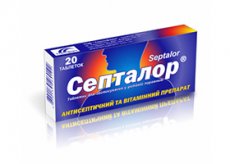Medical expert of the article
New publications
Preparations
Septalor
Last reviewed: 04.07.2025

All iLive content is medically reviewed or fact checked to ensure as much factual accuracy as possible.
We have strict sourcing guidelines and only link to reputable media sites, academic research institutions and, whenever possible, medically peer reviewed studies. Note that the numbers in parentheses ([1], [2], etc.) are clickable links to these studies.
If you feel that any of our content is inaccurate, out-of-date, or otherwise questionable, please select it and press Ctrl + Enter.

Release form
The drug is released in tablets, 10 pieces inside a blister plate. The pack contains 2 such plates.
 [ 11 ]
[ 11 ]
Pharmacodynamics
The medication has a combined composition – it contains 2 medicinal elements.
Chlorhexidine has an antibacterial effect, which is provided by non-specific synthesis with phospholipids of the walls of bacterial cells, inside which chlorhexidine slows down the action of ATPase and dehydrogenase, and in addition strengthens the strength of the membrane in relation to amino acids with nucleotides and potassium.
Chlorhexidine in small concentrations (below 20 mg/l) also has a bacteriostatic effect. Its use in high concentrations leads to the development of a bactericidal effect. It mainly affects gram-positive microbes and Candida albicans, and also, less intensively, gram-negative bacteria.
The substance demonstrates the greatest effectiveness against Streptococcus mutans, salivary streptococcus, Escherichia coli, Selenomonas, Candida albicans and anaerobes. A weaker effect is shown against Proteus, Klebsiella with Pseudomonas and Streptococcus sanquis with Veillonella species.
Vitamin C reduces swelling and inflammation in the oral and nasopharyngeal mucosa, while enhancing the immune response and acting as a cofactor during tissue healing and collagen binding processes.
Pharmacokinetics
Chlorhexidine is almost not absorbed through the epidermis and mucous membranes. During the absorption process, the substance is gradually released, penetrating into saliva and being synthesized with the oral and lingual mucous membranes, and then returning to saliva again, within which its antibacterial effect is carried out.
When chlorhexidine is swallowed with saliva, its absorption within the gastrointestinal tract is very weak. A small portion of the substance undergoes hepatic metabolism and is then excreted through the intestines with bile. Often, 90% of the element is excreted unchanged, along with feces.
The level of chlorhexidine inside the body is measured using HPLC, which has a sensitivity of no more than 1 mg/l.
Vitamin C is well absorbed, penetrating into the gastrointestinal tract. It is synthesized with intraplasmic protein by about 25%. After metabolic processes, the substance is transformed into dihydroascorbic and oxalic acid. Excretion occurs mainly with urine.
Dosing and administration
The medicine is prescribed in a dose of 1 tablet 4 times a day (taken at intervals of 6 hours). The taken tablet must be sucked. The medicine is used after eating and brushing teeth. After the tablet has dissolved, it is recommended to drink less liquid and not rinse the mouth for the next 120 minutes.
On average, the treatment cycle lasts 5-7 days. It is prohibited to use the medicine for more than 2 weeks.
Use Septalora during pregnancy
Tests on the effects of chlorhexidine on pregnant women have not been performed.
Animal experiments used doses that were 300 times (in rats) and 40 times (in rabbits) larger than the doses that a person could receive when taking chlorhexidine. No embryotoxic effects were reported in these cases. Before using the drug, consult your doctor.
There are no studies on the passage of chlorhexidine into breast milk, but vitamin C can penetrate into it. Therefore, a breastfeeding mother should consult her doctor before using Septalor.
Side effects Septalora
Occasionally, allergic reactions are reported, including rashes, nasal congestion, swelling in the parotid glands, and flaking of the oral mucosa. In addition, increased plaque, taste bud disorders, brown spots on dentures or teeth, and fillings are noted. Nausea, irritation of the gastric mucosa, inflammation or irritation in the oral mucosa, vomiting, belching, and diarrhea may also develop.
The drug contains the element Ponceau R4, which may be the cause of the appearance of allergy symptoms.
Application for children
It is prohibited to prescribe to children under 12 years of age.
 [ 39 ], [ 40 ], [ 41 ], [ 42 ]
[ 39 ], [ 40 ], [ 41 ], [ 42 ]
Analogues
Analogues of the drug are Hexoral, Hexoral spray, Hexosept, Denta sept, Dentagel, Corsodyl mint, Metrogeks, Metrogyl denta, Metrodent, Metrozol, Metronidazole denta, Miconazole nitrate, Periochip, Piralvex, Proposol, Septofort, Stomatidin, Stomolik, Trachisan, Farington.
Attention!
To simplify the perception of information, this instruction for use of the drug "Septalor" translated and presented in a special form on the basis of the official instructions for medical use of the drug. Before use read the annotation that came directly to medicines.
Description provided for informational purposes and is not a guide to self-healing. The need for this drug, the purpose of the treatment regimen, methods and dose of the drug is determined solely by the attending physician. Self-medication is dangerous for your health.

